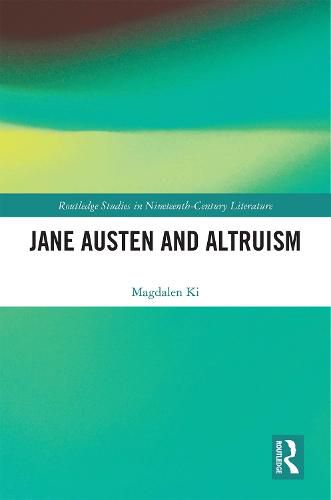Readings Newsletter
Become a Readings Member to make your shopping experience even easier.
Sign in or sign up for free!
You’re not far away from qualifying for FREE standard shipping within Australia
You’ve qualified for FREE standard shipping within Australia
The cart is loading…






Jane Austen and Altruism identifies a compelling theme, namely, the view that Jane Austen propounds a rigorous, boundary-sensitive model of altruism that counters the human propensity to selfishness and promotes the culture of cooperation. In her days, altruism was commonly known as benevolence , charity, or philanthropy , and these concepts overlap with Auguste Comte’s later definition of altruism as otherism . This volume argues that Austen’s thinking co-opts the evolutionary idea that altruism is seldom truly pure, egoism cannot be eradicated, and boundless group altruism is not sustainable. However, given that she comes from a naval and clergy family, she witnesses the power of wartime patriotism, the Evangelical revival, the Regency culture of politeness, and the sentimental novels. In her novels, she locates human relationships along an altruism continuum that ranges from enlightened selfishness to pathological altruism. Unconditional love is hard to find, but empathy, kin altruism, reciprocal exchange, and group altruism are key to the formation of self-identity, family, community and the nation state.
$9.00 standard shipping within Australia
FREE standard shipping within Australia for orders over $100.00
Express & International shipping calculated at checkout
Jane Austen and Altruism identifies a compelling theme, namely, the view that Jane Austen propounds a rigorous, boundary-sensitive model of altruism that counters the human propensity to selfishness and promotes the culture of cooperation. In her days, altruism was commonly known as benevolence , charity, or philanthropy , and these concepts overlap with Auguste Comte’s later definition of altruism as otherism . This volume argues that Austen’s thinking co-opts the evolutionary idea that altruism is seldom truly pure, egoism cannot be eradicated, and boundless group altruism is not sustainable. However, given that she comes from a naval and clergy family, she witnesses the power of wartime patriotism, the Evangelical revival, the Regency culture of politeness, and the sentimental novels. In her novels, she locates human relationships along an altruism continuum that ranges from enlightened selfishness to pathological altruism. Unconditional love is hard to find, but empathy, kin altruism, reciprocal exchange, and group altruism are key to the formation of self-identity, family, community and the nation state.